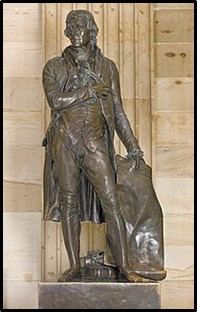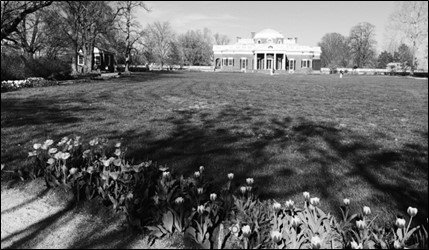In a 2022 essay for Abbeville, “Jefferson’s Textured Republicanism,” I examine letters by Jefferson on the differences between Federalists and Republicans. Jefferson argues that there is a constitutional (physical) difference between Federalists (Tories) and Republicans (Whigs), which manifests itself in polar political sentiments. Republicans and Whigs are Saxon-sympathizers; Federalists and Tories, Norman-sympathizers. In a letter from Jefferson to Marquis de Chastellux (2 Sept. 1785), Jefferson, like a good Hippocratic, brings climate into play to explain biological differences—climate influencing biology to explain Northerners’ attachment to Federalism and Southerners’, to Republicanism. While Northerners and Southerners are liberty-loving—that comes as no surprise given the uniformity of opinion of Colonial representatives to begin the Revolutionary War—Northerners are cool, sober, and chicaning, while Southerners are fiery, voluptuary, and candid, inter alia.
Those three features are underscored in one of the seminal documents of Jefferson’s authorship: his A Summary View of the Rights of British Americans (SV, 1774) and missing, relatively so, from his Declaration of Independence (DI, 1776) two years later. While SV is fiery, voluptuary, and candid, DI is cool, sober, and, though not chicaning, not so candid at SV. If that is correct, then SV typifies the pen of Jefferson qua Southerner; DI, Jefferson qua American, even cosmopolitan.
When the British closed the port of Boston in 1774, because of the Boston Tea Party (16 Dec. 1773), Jefferson, just 30 at the time, complained in the manner he best knew how to complain—with his pen. He crafted what would become his A Summary View of the Rights of British America (1774)—a set of instructions for Virginian delegates to the Continental Congress, which was essentially a 7000-word list of complaints, aimed chiefly at the king of England, concerning Americans’ contravened rights. That was the same year that Jefferson was granted the right to purchase his 157-acre tract of land on which the Natural Bridge sat.
Jefferson begins by calling his document a “humble and dutiful address” to lay before the king certain complaints of the subjects of the king. It might be dutiful, but it is far from humble. Jefferson is angry: He is in the face of George III.
First, Jefferson begins by putting into place the king. He addresses the king as an equal citizen, not as a superior. George III is merely primus inter pares, not above the people and certainly not above the laws. The king is nothing more than:
the chief officer of the people, appointed by the laws, and circumscribed with definite powers, to assist in working the great machine of government erected for their use, and consequently subject to their superintendence.
Thus, no citizen ought to grovel before the king. He writes truthfully, and what he writes is “divested of those expressions of servility.”
The main body of the writing is a lengthy articulation of the many “unwarrantable encroachments and usurpations.” Jefferson says,
Scarcely have our minds been able to emerge from the astonishment into which one stroke of parliamentary thunder has involved us, before another more heavy and more alarming is fallen on us. Single acts of tyranny may be ascribed to the accidental opinion of a day; but a series of oppressions, begun at a distinguished period, and pursued unalterably thro’ every change of ministers, too plainly prove a deliberate, systematical plan of reducing us to slavery.
I offer merely a few instances of abuses. Jefferson limns numerous coercive acts, passed by the British Parliament, including, among numerous others, the Stamp Act, an act suspending the legislature of New York, an act for duties on tea, and an “act for the suppression of riots and tumults in the town of Boston.”
The king has acted as if the rights of Colonists were “the gift of their chief magistrate,” not “derived from the laws of nature.” Yet they are given by nature and what nature gives, the king cannot negative. As Jefferson says at the end of the document, “the God who gave us life gave us liberty at the same time; the hand of force may destroy, but [it] cannot disjoin them.”
At 31, Jefferson is sufficiently boldfaced—that is the Southerner in him, but it does not hurt to be separated by some 3000 miles of ocean!—to advise the king on how it is that a king ought to act. George III has the power of negativing any act, but “for the most trifling reasons,” he has refused to do so—slavery foremost among them.
The abolition of domestic slavery is the great object of desire in those colonies where it was unhappily introduced in their infant state. But previous to the infranchisement of the slaves we have, it is necessary to exclude all further importations from Africa. Yet our repeated attempts to effect this by prohibitions, and by imposing duties which might amount to a prohibition, have been hitherto defeated by his majesty’s negative: thus preferring the immediate advantages of a few British corsairs to the lasting interests of the American states, and to the rights of human nature deeply wounded by this infamous practice.
George III has, in effect, reduced the Colonists to feudal serfs.
A general principle indeed was introduced that “all lands in England were held either mediately or immediately of the crown”: but this was borrowed from those holdings which were truly feudal, and only applied to others for the purposes of illustration. … America was not conquered by William the Norman, nor it’s lands surrendered to him or any of his successors.
Colonists’ lands are allodial, not of the king.
America’s ancestors acted on a right, granted by nature,
of departing from the country in which chance, not choice has placed them, of going in quest of new habitations, and of there establishing new societies, under such laws and regulations as to them shall seem most likely to promote public happiness.
Jefferson adds that when the first waves of Colonists arrived in the New World,
not a shilling was ever issued from the public treasures of his majesty or his ancestors for their assistance, till of very late times, after the colonies had become established on a firm and permanent footing.
The crown took interest in the New World only when it had become fiscally profitable to take an interest. From an investment of nothing, George III bids to take everything.
Beginning by putting into place George III, Jefferson ends similarly. He commences by asserting American fearlessness.
Let those who flatter fear; it is not an American art. To give praise which is not due might be well from the venal, but [it] would ill beseem those who are asserting the rights of human nature.
Jefferson continues:
Kings are the servants, not the proprietors of the people. … The whole art of government consists in the art of being honest. Only aim to do your duty, and mankind will give you credit where you fail. No longer persevere in sacrificing the rights of one part of the empire to the inordinate desires of another: but deal out to all equal and impartial right.
George III is then advised to open his breast “to liberal and expanded thought.” The verdict of history on the reign of George III—“let not the name of George the third be a blot in the page of history”—depends very likely on the king, obeying the advice of his “great American council.” Fame and future felicity are at stake.
What is one to say of such an audacious, remarkable document?
There is nothing like it among Jefferson’s other political documents. It is, through and throughout, an indignant writing. Southerners, I believe, are not quick to anger—for they take seriously their anger, as they wish it to be fully justifiable—but when they do become angry, they express it artfully, unremorsefully, thoughtfully, and unequivocally. Jefferson in his SV is artful, unremorseful, thoughtful, and without equivocation. It is perhaps the only political document where he aims to express political gripes and what are to him universal truths in a manner, typically Southern. He is in SV not an American or cosmopolitan ambassador for liberty and equality, but a Southern ambassador.







“Colonists’ lands are allodial, not of the king.”
If your interpretation of Jefferson’s beliefs are accurate in this specific regard, then it is just further proof that the centralized national power entity set up by the constitution wholly reflected the views of men who considered themselves the new ‘royal’ elite in the united states, not representatives of the people. Property title from the start, to this day in this country, is regarded as fee simple, not allodial in nature. It is held as a mere lease from a ruling sovereign only so long as the recurring tribute payments are made to the master and actual owner.
“Allodial” is TJ’s wording, but to be taken as “not feudal.” He writes, “Possessions there [in Saxon times] are undoubtedly of the allodial nature.” Your point is understood.